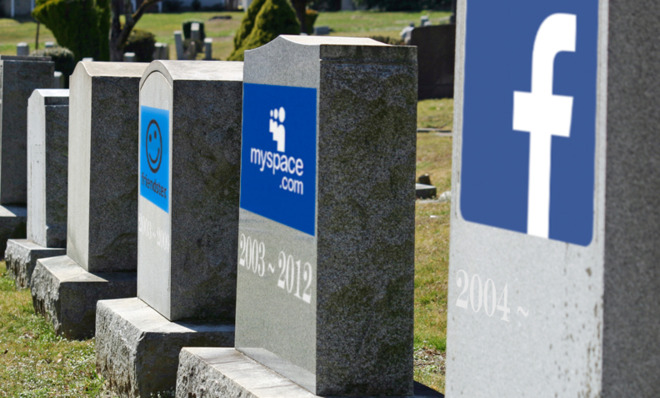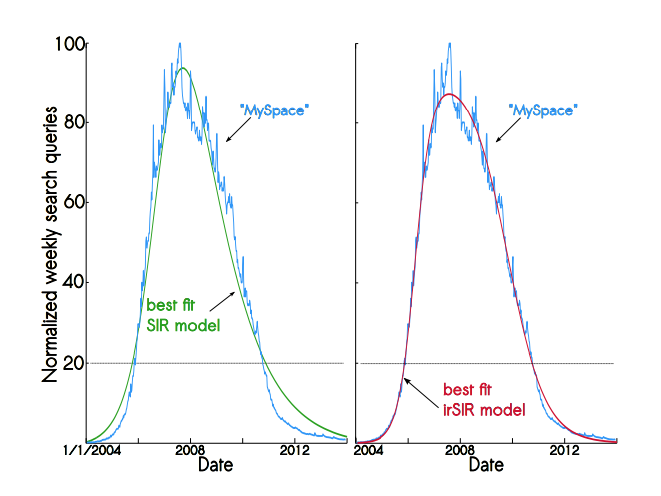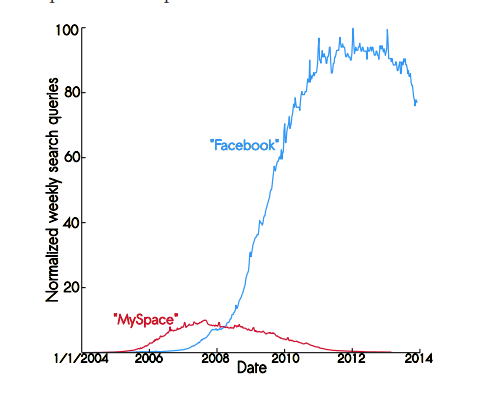Facebook is not doomed to die like MySpace
Sure, Facebook isn't as "cool" as Snapchat. But that doesn't mean the company is toast.

A free daily email with the biggest news stories of the day – and the best features from TheWeek.com
You are now subscribed
Your newsletter sign-up was successful
Facebook may lose as many as 80 percent of its users by 2017, according to a new study.
John Cannarella and Joshua Spechler of Princeton University used models of the spread of disease to explain user adoption and abandonment of social networks, where adoption is analogous to infection and abandonment is analogous to recovery. They found that MySpace had grown and declined in exactly this disease-like manner — fast growth, a peak, and then a decline. (The researchers used searches as a proxy measurement for adoption — the idea being that if someone searches "MySpace" or "Facebook," more often than not it's a non-user interested in joining.)

The Week
Escape your echo chamber. Get the facts behind the news, plus analysis from multiple perspectives.

Sign up for The Week's Free Newsletters
From our morning news briefing to a weekly Good News Newsletter, get the best of The Week delivered directly to your inbox.
From our morning news briefing to a weekly Good News Newsletter, get the best of The Week delivered directly to your inbox.
And they found that so far, Facebook has followed a similar pattern:

How worrying is this for Facebook? Well, on its own it means very little. MySpace died as it became clogged up with spam, was neglected and misunderstood by its new corporate owner, and after its users migrated to other social networks, particularly Facebook.
Facebook doesn't necessarily face any of these problems.
A free daily email with the biggest news stories of the day – and the best features from TheWeek.com
While Facebook has introduced advertising and while spam is a problem, Facebook has done a reasonable job at fighting spam. It has thus been far less intrusive than the huge quantities of spam that infested MySpace in its dying years.
Another big difference: At Facebook, founder Mark Zuckerberg remains in charge, and the company is making profits.
And while Facebook faces lots and lots of fast-growing social competitors — Snapchat, Instagram, Reddit, Tumblr, Twitter, and WhatsApp, to name just a few — Facebook has been able to acquire Instagram, a serious competitor.
Still... there is another troubling sign that might frighten Zuckerberg & Co., at least a little.
Facebook use has begun to decline among young people. Between January 2011 and January 2014, Facebook use declined 25.3 percent among those aged 13 to 17, and 7.5 percent among those aged 18 to 24. It grew 41.4 percent among those aged 35 to 54, and a huge 80.4 percent among those aged 55+.
A European study released last month by University College London found that among older teenagers, Facebook is "not just on the slide, it is basically dead and buried," replaced by simpler social networks such as Twitter and Snapchat. However, teenagers keep their Facebook profiles live to stay in touch with older relatives, among whom it remains popular.
This raises the possibility that instead of dying out, Facebook may be able to remain afloat as a family-friendly social network, even while the trendsetting young migrate to newer, cooler networks where their parents do not have profiles.
And if worst comes to worst and the older generations that Facebook has relied upon for growth in the past three years go elsewhere, Facebook has the cash to buy out some strongly growing upstarts, just as it did with Instagram which is growing at a tremendous rate.
In other words, even if Facebook the social network dies, Facebook the company is likely to outlive it.
John Aziz is the economics and business correspondent at TheWeek.com. He is also an associate editor at Pieria.co.uk. Previously his work has appeared on Business Insider, Zero Hedge, and Noahpinion.
-
 Ex-South Korean leader gets life sentence for insurrection
Ex-South Korean leader gets life sentence for insurrectionSpeed Read South Korean President Yoon Suk Yeol was sentenced to life in prison over his declaration of martial law in 2024
-
 At least 8 dead in California’s deadliest avalanche
At least 8 dead in California’s deadliest avalancheSpeed Read The avalanche near Lake Tahoe was the deadliest in modern California history and the worst in the US since 1981
-
 Political cartoons for February 19
Political cartoons for February 19Cartoons Thursday’s political cartoons include a suspicious package, a piece of the cake, and more